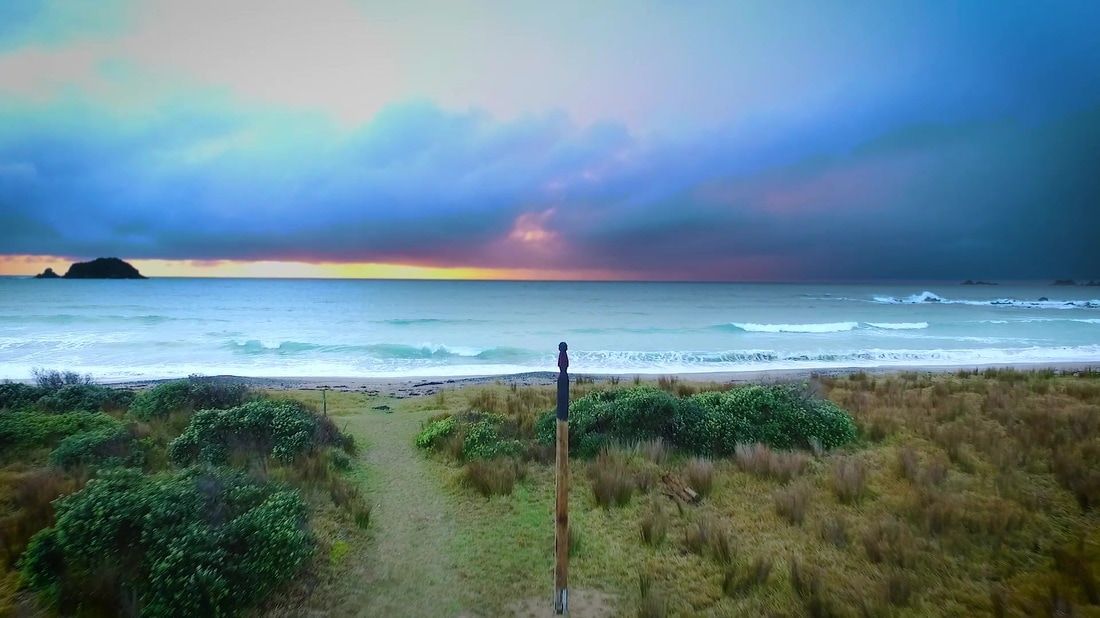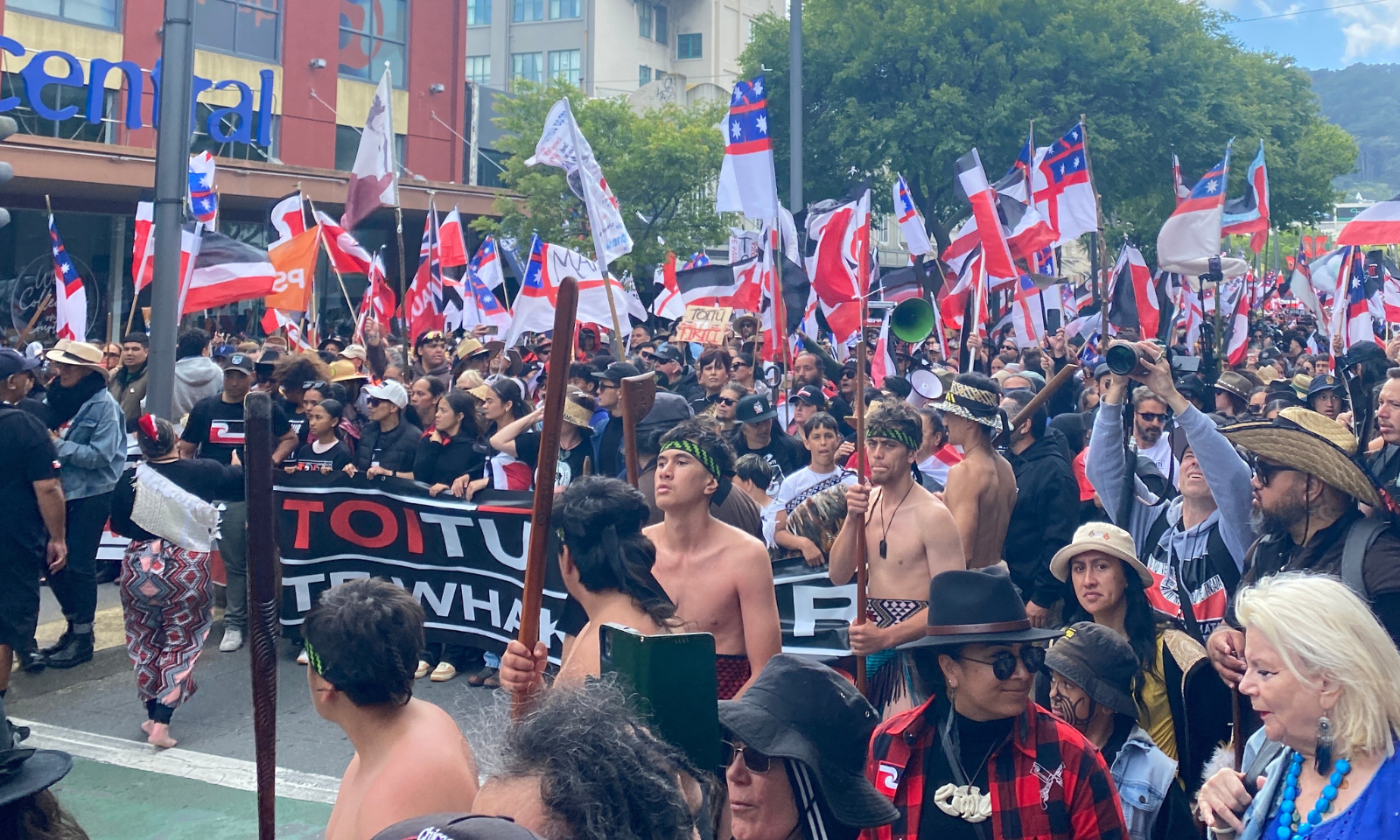

Tens of thousands of people protest against the Foreshore and Seabed Act.
Photo/ReNews/File
Māori ocean rights under threat: Why Pasifika should be paying attention
As the New Zealand Government moves to restrict Māori ocean rights, Pacific people are being warned: "when Māori are targeted, we’re all at risk".


US funding cuts threaten to 'dry up' future of Pacific scientists - expert


Fiji’s former Prime Minister and police chief charged with inciting mutiny

Inked across lands: How Pacific tattoo art is thriving in Germany

US funding cuts threaten to 'dry up' future of Pacific scientists - expert


Fiji’s former Prime Minister and police chief charged with inciting mutiny
A controversial move by the New Zealand Government to tighten laws around customary marine title is sparking growing concern among Māori, and Pacific communities are being urged to pay close attention.
The coalition government’s proposed changes to the Marine and Coastal Area (Takutai Moana) Act would make it harder for Māori iwi and hapū to gain legal recognition of their ancestral rights to the moana (ocean) and takutai (coastline).
Veteran Māori activist Reuben Taipari has called it a "massive confiscation".
He told William Terite on Pacific Mornings that this would strip away fundamental rights, not just for Māori, but with ripple effects for Pasifika.
“If you want to see Dawn Raids return, do nothing.
"Our Pacific whānau, our Asian whānau, all our immigrant whānau need to understand - every time Māori rights are undermined, you're going to be next.”

The Marine and Coastal Area Act creates special status for the “common marine and coastal area”, meaning neither the Crown nor any other person can own it. Photo/https://ngatiwai.iwi.nz/
Why this matters for the Pacific
For Pacific people, land and ocean are not just resources - they are identity, whakapapa, and legacy.
From Sāmoa to Tonga, Fiji to the Cook Islands, Pacific nations have long recognised the ocean as a source of life, community, and belonging.
Pacific people living in Aotearoa share that same deep spiritual and genealogical connection to the sea.
Taipari says Pacific communities must stand in solidarity with Māori. “Our cultures are the same. Our values are the same. Our identities are linked. This fight is your fight too.”
Listen to Reuben Taipari's full interview below.
The law behind the fight
The Marine and Coastal Area Act, introduced in 2011, allows Māori to apply for Customary Marine Title - a legal recognition of ancestral rights over parts of the coastline and sea.
But the process is already tough, requiring applicants to prove continuous and exclusive use of an area since 1840.
The government now wants to make the process even harder. Justice Minister Paul Goldsmith says the changes are about "restoring the law to its original intent". But critics argue it’s simply a new version of old colonial tactics, taking without consent.
“They're removing our right to go to court,” Taipari told Terite. “That’s undemocratic. That’s not justice. That’s not how a Treaty partner should behave.”
History repeating itself?
The proposal is drawing comparisons to the Foreshore and Seabed Act 2004, which triggered some of the biggest Māori protest movements in modern history. That law was eventually repealed, but now, many fear a repeat.
Even former National Party MPs, including Chris Finlayson, the architect of the current law, have criticised the government’s move. Māori, Pasifika, and constitutional law experts warn that it undermines the Treaty of Waitangi and weakens the country’s democratic foundations.

Hīkoi mō te Tiriti (March for the Treaty) were held across Aotearoa in November 2024. Photo/PMN News/William Terite
Youth and the future
As Māori and Pacific youth face a political climate that feels increasingly hostile, from the repeal of Māori wards to public attacks on te reo Māori, Taipari’s message is one of resistance and pride.
“Stand up and fight for who you are,” he says. “There’s nobody like us in this world. Our culture, our ancestors, our language - that’s our superpower.”
A call to Pacific solidarity
With intermarriage, shared whakapapa, and cultural values connecting Māori and Pacific peoples, Taipari says the attack on Māori rights is not just a Māori issue.
“We live together. We stand together. And when Māori rise, we all rise.”
Community leaders across Pacific organisations have echoed the call for solidarity. Tagaloatele Professor Peggy Fairbairn-Dunlop, a Pacific scholar, says the reforms threaten not just justice but the shared vision of unity in Aotearoa.
“This is about our collective future. When indigenous rights are protected, everyone’s rights are stronger.”

The 1974-76 dawn raids have been described as 'the most blatantly racist attack on Pacific people by the New Zealand government in New Zealand's history'. In In early August 2021, Prime Minister Jacinda Ardern formally apologised for the dawn raids on behalf of the government. Photo/Facebook
Looking ahead
The government is moving quickly to pass the legislation, with limited public consultation.
Opposition parties, including Te Pāti Māori, Labour, and the Greens, have promised to repeal the law if they regain power.
In a statement, the Green Party says the passing of the Marine and Coastal Area (Takutai Moana) (Customary Marine Title) Amendment Bill robs Māori of customary rights to the Takutai Moana.
“This Government is selling out Māori with a Bill that prioritises profit over taonga and is another form of raupatu,” Steve Abel, the Greens' spokesperson for Māori-Crown relations, says.
The bill is expected to go to a select committee in the coming weeks. Pacific and Māori communities are being urged to make submissions, attend hui, and raise their voices.
Why Pacific people should care
This is more than a legal debate. It’s a question of who belongs, who decides, and whose voices matter.
If Māori lose the right to defend their connection to the ocean in court, Pasifika risk losing that right too, either now or in the future.
Taipari says the ocean doesn’t divide us, it connects us. "Now is the time to stand together."